Fahrer Group - Immunology
 Photo: Left to Right: Dr. Lawrence Wilson, Associate Professor Aude Fahrer, Dr. Angelo Theodoratos, Dr. Katharine Gosling, Dr. Christina Carroll and Mr. Joshua Miasek
Photo: Left to Right: Dr. Lawrence Wilson, Associate Professor Aude Fahrer, Dr. Angelo Theodoratos, Dr. Katharine Gosling, Dr. Christina Carroll and Mr. Joshua Miasek
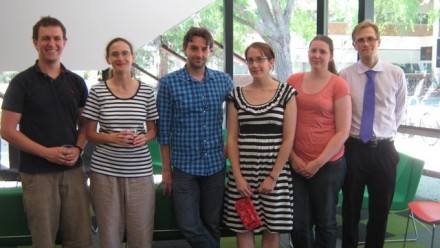 Photo: Left to Right: Mr.Andrew Almonte, Associate Professor Aude Fahrer, Mr. George Cavic
Photo: Left to Right: Mr.Andrew Almonte, Associate Professor Aude Fahrer, Mr. George Cavic
 Photo: Left to Right: Mr. George Cavic, Mr. Andrew Almonte, Associate Professor Aude Fahrer and Ms. Ruth Purcell
Photo: Left to Right: Mr. George Cavic, Mr. Andrew Almonte, Associate Professor Aude Fahrer and Ms. Ruth Purcell
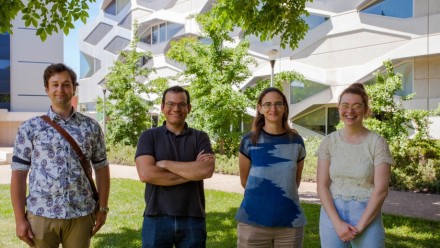
The Group is focused on two main areas of research at the moment:
- A very simple and inexpensive cancer immunotherapy treatment I have come up with, involving a single injection of an immune stimulant into a tumour.
- A bioinformatics study looking for novel proteins in different genomes. We have just recently around 2000 novel proteins from humans and mice.
Group Leader
Honorary Lecturer
Divisional Visitor
Honours Students
PhB Student
PhD Student
Volunteer
Selected publications
- Almonte, A, Cavic, G, Neeman, T, Enders, A, Fahrer, A.M. (2022) Gut microbiome-depleting antibiotic regimens are not tolerated by all mouse strains: learn from (our) bitter experience, Journal for ImmunoTherapy of Cancer, Volume 10, Issue 11.
- Carroll, C, Andrew, E, Malik, L et al. (2021), Simple and effective bacterial-based intratumoral cancer immunotherapy, Journal for ImmunoTherapy of Cancer, vol. 9, no. 9.
- Almonte, A, Rangarajan, H, Yip, D et al. (2020) How does the gut microbiome influence immune checkpoint blockade therapy?, Immunology and Cell Biology, 99: 361–372.
- Wang, J, Gross, G, Andrew, E et al. (2019) A predicted novel protein isoform of HOXA9, Leukemia Research, 82:7-10.
- Carroll, C, Altin, J, Neeman, T et al. (2015) Repeated fine-needle aspiration of solid tumours in mice allows the identification of multiple infiltrating immune cell types, Journal of Immunological Methods, 425:102-107.
- Wilson L.O., Spriggs A, Taylor J.M., Fahrer A.M. (2014) A novel splicing outcome reveals more than 2000 new mammalian protein isoforms.Bioinformatics. Jan 15;30(2):151-6
- Wilson, L.O; Fahrer, A.M. (2013) Condensins, chromatin remodeling and gene transcription, Chromatin Remodelling, Dr Danuta Radzioch (Ed.), ISBN: 978-953-51-1087-3 InTech. Also available from InTech Open
- Fahrer, Aude M, (2012). A proposal for a simple and inexpensive therapeutic cancer vaccine, Immunology and Cell Biology 90 (3) 310-313
- Theodoratos, Angelo; Wilson, Laurence O. W.; Gosling, Katharine M.; et al. (2012) Splice variants of the condensin II gene Ncaph2 include alternative reading frame translations of exon 1, Febs Journal 279 (8) 1422-1432
- Theodoratos, A; Whittle, B; Enders, A; et al. (2010), Mouse strains with point mutations in TAP1 and TAP2, Immunology and Cell Biology 88 (1) 72-78
- Gosling, KM; Goodnow, CC; Verma, NK; et al (2008), Defective T-cell function leading to reduced antibody production in a kleisin-beta mutant mouse, Immunology 125 (2) 208-217
- Gosling, KM; Makaroff, LE; Theodoratos, A; et al (2007) A mutation in a chromosome condensin II subunit, kleisin beta, specifically disrupts T cell development, Proceedings of the National Academy Of Sciences of the United States Of America 104 (30) 12445-12450
- Liston, A; Lesage, S; Gray, DHD; et al, (2004) Generalized resistance to thymic deletion in the NOD mouse: A polygenic trait characterized by defective induction of Bim, Immunity 21 (6) 817-830
- Fahrer, AM; Bazan, JF; Papathanasiou, P; et al (2001) A genomic view of immunology, Nature 409 (6822) 836-838
- Fahrer, AM; Konigshofer, Y; Kerr, EM; et al,(2001) Attributes of gamma delta intraepithelial lymphocytes as suggested by their transcriptional profile, Proceedings of the National Academy Of Sciences of the United States Of America 98 (18) 10261-10266.
All publications
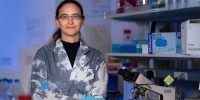
Bacteria blasting cancer treatment shows promise

Aude Fahrer, putting cancer on trial
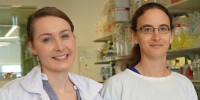
Erin Andrew wins ANU 3 Minute Thesis competition

Aude Fahrer
Two main areas of research at the moment:
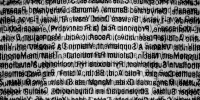
New beginnings

BSB PhD Exit Seminar: Bacteria-based cancer immunotherapy: A re-emerging strategy with contemporary implications
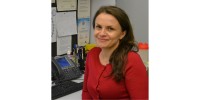
Mitochondrial Protein Import in Health and Disease
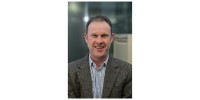
Chromatin structure and epigenetics in Plasmodium falciparum
The genome of the malaria parasite Plasmodium falciparum is maintained primarily as transcriptionally competent, euchromatin with only rest













